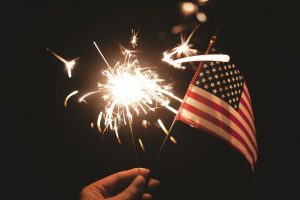Independence Day!
The 4th of July, a holiday that celebrates the Independence of our country. It is also a holiday that is associated with outdoor activities like going to the beach, having a family cook-out, and using fireworks. Seeing colorful explosions in the sky has become a tradition for the 4th of July much like eating turkey on Thanksgiving. However, fireworks are considered to be explosives which is why each state, and city, has specific firework restrictions.
This year, July 4th lands on a Monday so most people will mostly likely want to celebrate their nation’s Independence Day during the weekend. If you plan on celebrating America’s birthday by lighting some bottle rockets or other types of fireworks, it’s important to know the rules to playing with fire to avoid getting into trouble or risking serious injury.
Texas’ Laws On Fireworks
The state of Texas has some of the most relaxed laws in the country when it comes to fireworks. In Texas, it is legal to sell all fireworks to the public, with some restrictions on the fireworks themselves. Restrictions like the overall length of the firework cannot be more than 15 inches, or the explosive powder used cannot be more than four grams.
San Antonio’s Firework Restrictions
The purchase, use and/or transport of fireworks is illegal within the San Antonio city limits. Considered a Class C misdemeanor in the eyes of law, and can carry a fine of up to $2,000.
According to the Bexar County website, these are all the restrictions with fireworks. Some of these rules may not apply to you, but when it comes to the use a fireworks a person may not:
1) Explode or ignite fireworks within 600 feet of any church, a hospital other than a veterinary hospital, an asylum, a licensed child care center, or a public or private primary or secondary school or institution of higher education unless the person receives authorization in writing from that organization;
- Can’t use fireworks near public buildings or schools.
(2) Sell at retail, explode or ignite fireworks within 100 feet of a place where flammable liquids or flammable compressed gasses are stored and dispensed;
- Don’t lite fireworks near gas stations, propane tanks, etc.
(3) Explode or ignite fireworks within 100 feet of a place where fireworks are stored or sold;
- Don’t lite your fireworks in the parking lot outside the store where you just purchased them.
(4) Ignite or discharge fireworks in or from a motor vehicle;
- Don’t lite a bottle rocket, or any other firework, while driving.
(5) Place ignited fireworks in, or throw ignited fireworks at, a motor vehicle;
- Don’t toss a lite firework into your car or truck.
(6) Conduct a public fireworks display that includes Fireworks 1.3G unless the person is a licensed pyrotechnic operator;
- No huge firework display unless you are a trained professional.
(7) Conduct a proximate display of fireworks that includes Fireworks 1.3G or Fireworks 1.4G as defined in NFPA 1126 Standards for the Use of Pyrotechnics Before a Proximate Audience unless the person is a licensed pyrotechnic special effects operator and has the approval of the local fire prevention officer;
- No firework shows unless you are a professional and have permission.
(8) Sell, store, manufacture, distribute, or display fireworks except as provided by this chapter or rules adopted by the commissioner under this chapter.
- You need permission to be in the firework business.
These restrictions are for the benefit of the community and your safety. Some of these rules may seem like common sense, but its better to be safe than sorry. If you are planning on buying and igniting fireworks this 4th of July remember to use caution and be safe.

Jeff’s here 4 you!
If you or a loved one has been injured in an accident, Jeff is here for you! Davis Law Firm is standing by 24/7 to take and listen to your call. Our team of legal representatives offer free consultation, so don’t suffer another day and contact us today!
